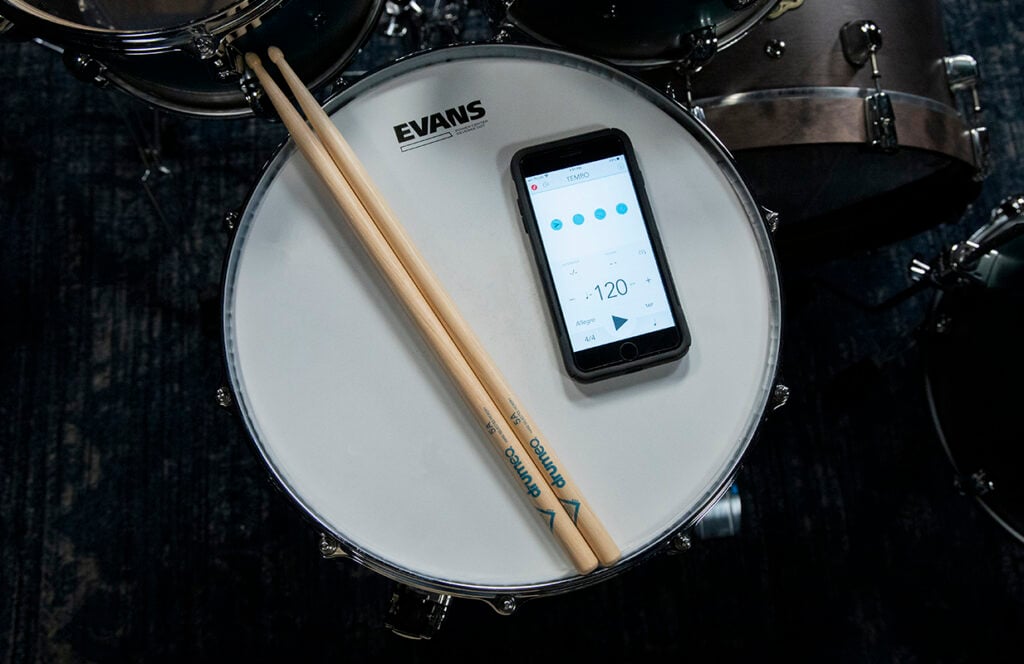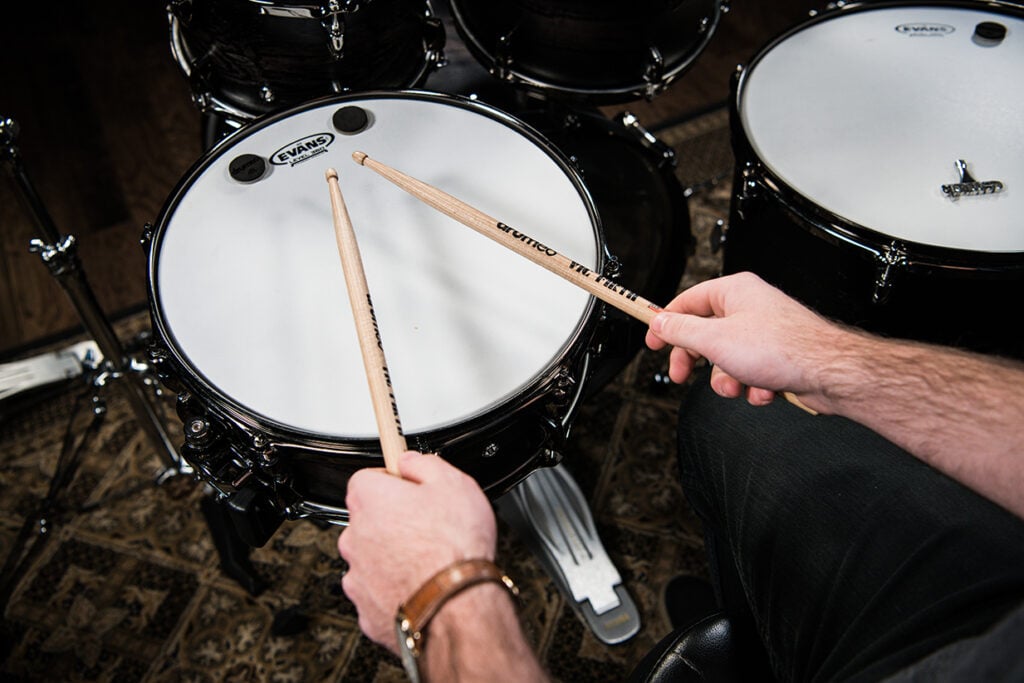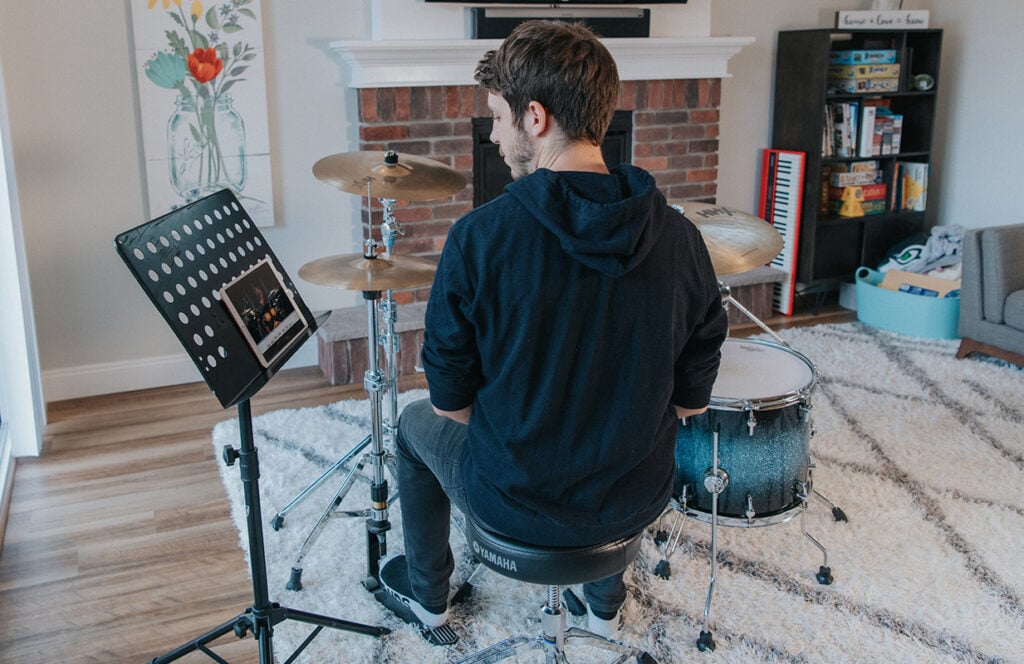If you can play a flam paradiddle, you can play a flam paradiddle-diddle. This drum rudiment is typically played in a triplet feel and sounds great in beats, fills, solos and more.

If you’re already familiar with the flam paradiddle and the paradiddle-diddle, this rudiment should come easily to you.
You just need to add a flam to the start of a paradiddle-diddle’s six-note grouping.
Here’s what a flam paradiddle-diddle sounds like:
You can use this tool to practice along at the tempo that’s best for you (it’s the one Drumeo members use when practicing with the 3000+ play-along tracks inside our members area).
► Click here if you want to learn how to read drum music
First, master the flam and the paradiddle-diddle separately.
Make sure your double strokes are consistent and keep your flams crisp. There should be very little space between the grace note and the primary note.
The biggest challenge will be playing three consecutive taps as you move between groupings. The first two taps come from the double stroke, and the third tap is the grace note. Scroll back up to the notation if you need a visual reference.
Here are some tips to help your flam paradiddle-diddles.

When you’re first learning how to play something, it’s fine to test it out without a metronome as you get used to the pattern. But you shouldn’t go click-free for long. The metronome will help you develop a better internal clock and show you exactly where the timing of your strokes is inconsistent (or where it’s right on the grid).
You can buy a physical metronome at a music store or download a metronome app online.

While it might be tempting to get up to speed as quickly as possible – especially if you’re feeling confident – make sure you’re really starting each flam with a soft grace note and that your double stroke technique is solid.
Be honest with yourself and don’t increase the tempo until you’ve really got it down. Don’t just say “it’s good enough”. Develop control first, and speed will come later.
Try setting your metronome to 60 BPM and slowly work your way up 5 BPM at a time.

If you’re a right-handed drummer, you probably default to starting everything with your right hand. Even though the single flammed mill alternates naturally within the pattern, try starting the run with your left hand too. It may still trick your brain.

It’s easiest to correct your posture or grip immediately if you’re watching yourself in a mirror. Try to set up a practice pad and a snare stand in front of a full length mirror if you can.
You’ll be able to notice if you’re gripping your sticks too hard, or if your stick height doesn’t look right. Use your reflection as a window into how you’re doing. It’s like becoming your own drum teacher!

While playing in front of a mirror will help you fix issues on the fly, you might not realize during your practice when something is wrong. Sometimes we don’t notice issues while we’re in the middle of playing – especially if we’re concentrating hard.
Whether you’re propping your phone on your dresser or capturing it all with a camera and tripod, it’s helpful to watch your practice sessions and critique yourself from a ‘third party’ perspective.
We’ve put together a playlist with drumless tracks at different tempos so you can practice this rudiment over real music:
Once you’re comfortable playing them on a practice pad or a single drum, try moving them around the drum set.
You can keep the pattern on one drum or break it up between multiple surfaces. Try the following exercises to get started.
#1:
#2:
#3:
#4:
#5:
Any surface can be part of the pattern! This rudiment sounds awesome between the snare and toms.
If you’re a more advanced drummer, you could also challenge yourself by breaking up the sticking between your hands and feet.
With enough solid practice, you should start feeling more confident in your playing. If you can get comfortable with all 40 rudiments, you’ll be able to do virtually anything on the drums. The flam paradiddle-diddle is just one of many useful rudiments that’ll give you more creative ideas and control.
If you’re wondering what rudiment to learn next, check out the pataflafla.


By signing up you’ll also receive our ongoing free lessons and special offers. Don’t worry, we value your privacy and you can unsubscribe at any time.
We use cookies for traffic data and advertising. Cookie Policy »